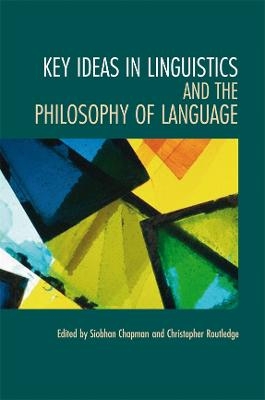
Key Ideas in Linguistics and the Philosophy of Language
Edinburgh University Press (Verlag)
978-0-7486-2618-2 (ISBN)
This book offers introductory entries on 80 ideas that have shaped the study of language up to the present day. Entries are written by experts in the fields of linguistics and the philosophy of language to reflect the full range of approaches and modes of thought. Each entry includes a brief description of the idea, an account of its development, and its impact on the field of language study. The book is written in an accessible style with clear descriptions of technical terms, guides to further reading, and extensive cross-referencing between entries. A useful additional feature of this book is that it is cross-referenced throughout with Key Thinkers in Linguistics and the Philosophy of Language (Edinburgh, 2005), revealing significant connections and continuities in the two related disciplines. Ideas covered range from Sense Data, Artificial Intelligence, and Logic, through Generative Semantics, Cognitivism, and Conversation Analysis, to Political Correctness, Deconstruction, and Corpora.
Features: * The only single-volume reference book to focus specifically on ideas from both linguistics and the philosophy of language * Accessibly written for use at all levels, including undergraduate, postgraduate, academic, and other general readers in the fields of linguistics and the philosophy of language * Extensively cross-referenced both within itself and with Key Thinkers in Linguistics and the Philosophy of Language to provide a unique reference resource.
Siobhan Chapman is Senior Lecturer in English Language at the University of Liverpool. She has previously taught at the University of Newcastle and the University of Kent. Her publications include Philosophy for Linguists (2000), Paul Grice, Philosopher and Linguist (2005), Key Thinkers in Linguistics and the Philosophy of Language (2005), Thinking about Language (2006) and Language and Empiricism, after the Vienna Circle (2008). Christopher Routledge is a freelance writer and editor who has worked extensively in reference publishing. He has written and edited articles and books on American literature, history, and popular culture, crime fiction, children's literature, language and linguistics, and British history. He has also taught English and American literature and English language at several UK universities.
Preface; Acknowledgements; Notes on Contributors; Acceptability/Grammaticality; Adequacy; Ambiguity/Vagueness; Analytic Philosophy; Analytic/Synthetic; Artificial Intelligence; Behaviourism; Cognitivism; Compositionality; Connotation/Denotation; Continuity; Conventional Meaning; Conversation Analysis; Corpora; Correspondence Theory; Creativity; Deconstruction; Deduction/Induction; Definite Descriptions; Descriptivism; (Critical) Discourse Analysis; Distinctive Features; Emic/Etic; Empiricism/Rationalism; Feminism; Generative Phonology; Generative Semantics; Glossematics; Holism; Ideational Theories; Implicature; Indeterminacy; Innateness; Integrationism; Intentionality; Intuition; Language Games; Language of Thought; Langue/Parole; Linguistic Relativity; Linguistic Variable; Logic; Logical Form; Logical Positivism; Mentalism; Metaphor; Minimalism; Modality; Model Theoretic Semantics; Names; Nonnatural Meaning; Optimality Theory; Ordinary Language Philosophy; Performatives; Phoneme; Politeness; Political Correctness; Port Royal Logic; Possible World Semantics; Poststructuralism; Presupposition; Private Language; Propositional Attitudes; Propositions; Prototype; Psychoanalysis; Relevance Theory; Sense Data; Sense/Reference; Signs and Semiotics; Situational Semantics; Speech act theory; Structuralism; Systemic-Functional Grammar; Transformational-Generative; Grammar; Truth Theories; Truth Value; Type/Token; Universal Grammar; Use/Mention; Index.
| Erscheint lt. Verlag | 20.1.2009 |
|---|---|
| Zusatzinfo | 6 black & white illustrations |
| Verlagsort | Edinburgh |
| Sprache | englisch |
| Maße | 156 x 234 mm |
| Gewicht | 539 g |
| Themenwelt | Geisteswissenschaften ► Philosophie ► Sprachphilosophie |
| ISBN-10 | 0-7486-2618-2 / 0748626182 |
| ISBN-13 | 978-0-7486-2618-2 / 9780748626182 |
| Zustand | Neuware |
| Haben Sie eine Frage zum Produkt? |
aus dem Bereich


